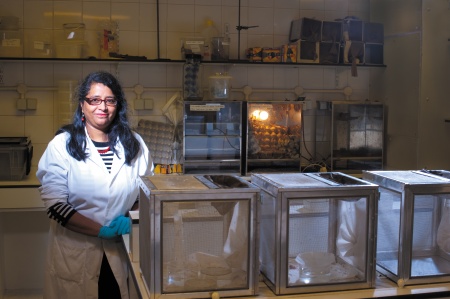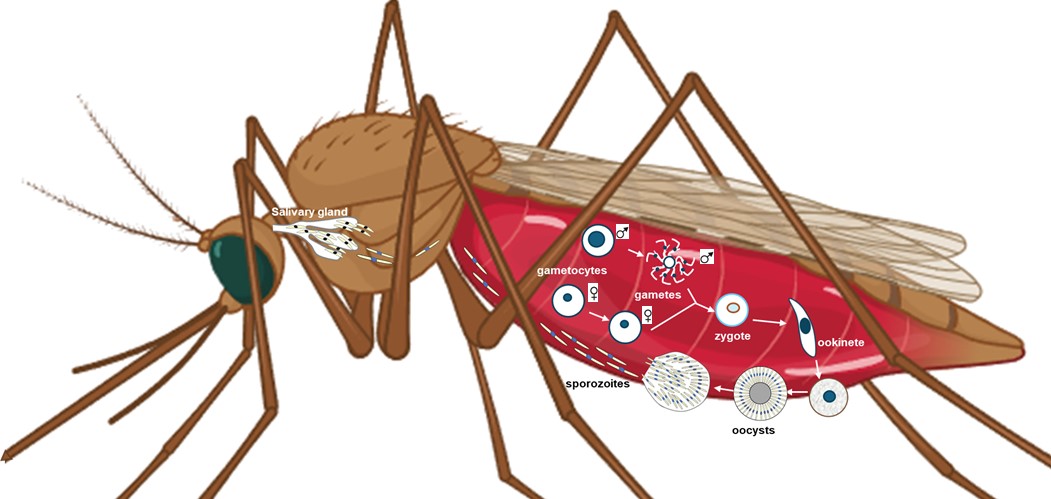Monday, 19 August 2024
International Mosquito Day
Tuesday 20 August marks World Mosquito Day – which is celebrated in memory of Sir Ronald Ross, a British Doctor who, in 1897, discovered that the female Anopheles mosquito transmits malaria. It was the first time a connection had been established between a mosquito and malaria.
Today, there are still a staggering 249 million cases of malaria worldwide. Although two vaccines have been rolled out, these only target disease in the human host and do nothing for controlling transmission or mosquito population (WHO, 2023). However, the fundamental knowledge of how the parasite survives and multiplies within the mosquito is still not well understood.
How is this relevant to people in the UK?
With global warming and climate changes, mosquitoes that are present in warm and humid tropical areas may also spread to other parts of the world. Some of these mosquitoes are responsible for transmitting many deadly diseases such as malaria, dengue and yellow fever. If the mosquitoes spread, this poses risk of these diseases spreading to many areas in the wider world, such as the UK , Europe, China and USA. These diseases are transmitted to humans through transfer of parasites, bacteria or viruses via mosquito bites.
Rita Tewari is a Professor of Cell Biology in the School of Life Sciences at the University of Nottingham.
 Professor Rita Tewari
Professor Rita Tewari
Professor Tewari says: “On World Mosquito Day, we want to highlight the challenges we face in how to prevent and control the transmission of these diseases by the mosquitoes. The Covid-19 pandemic taught us that as well as controlling a disease, we need to intervene with the transmission of pathogens. In the case of malaria, many of the parasite development stages occur within the female mosquito gut.”
What are we doing at Nottingham?
The team in Professor Rita Tewari’s lab are working on malaria parasites with a particular focus on understanding parasite proliferation/multiplication and the transmission stages in the mosquitoes.
Whilst the parasites are inside the mosquito, sexual reproduction occurs to produce parasites capable of infecting the human host. Gaining basic knowledge of how the parasite multiplies and thrives could help to develop intervention drugs or vaccine strategies to prevent parasite transmission and stop them in their tracks within the mosquito host.

Professor Tewari adds: “Whilst we do need to be aware of the risks associated with mosquitos, we also need to remember that mosquitoes are not all bad! Mosquitoes perform vital roles in the ecosystem, such as pollinating plants and acting as a food source for other animal species. For this reason, it is important that when trying to control diseases, the mosquitoes themselves are not eliminated therefore disturbing the ecosystem.”
Notes to editors:
About the University of Nottingham
Ranked 97 in the world and 17th in the UK by the QS World University Rankings, the University of Nottingham is a founding member of Russell Group of research-intensive universities. Studying at the University of Nottingham is a life-changing experience, and we pride ourselves on unlocking the potential of our students. We have a pioneering spirit, expressed in the vision of our founder Sir Jesse Boot, which has seen us lead the way in establishing campuses in China and Malaysia - part of a globally connected network of education, research and industrial engagement.
Nottingham was crowned Sports University of the Year by The Times and Sunday Times Good University Guide 2024 – the third time it has been given the honour since 2018 – and by the Daily Mail University Guide 2024.
The university is among the best universities in the UK for the strength of our research, positioned seventh for research power in the UK according to REF 2021. The birthplace of discoveries such as MRI and ibuprofen, our innovations transform lives and tackle global problems such as sustainable food supplies, ending modern slavery, developing greener transport, and reducing reliance on fossil fuels.
The university is a major employer and industry partner - locally and globally - and our graduates are the third most targeted by the UK's top employers, according to The Graduate Market in 2024 report by High Fliers Research.
We lead the Universities for Nottingham initiative, in partnership with Nottingham Trent University, a pioneering collaboration between the city’s two world-class institutions to improve levels of prosperity, opportunity, sustainability, health and wellbeing for residents in the city and region we are proud to call home.
More news…